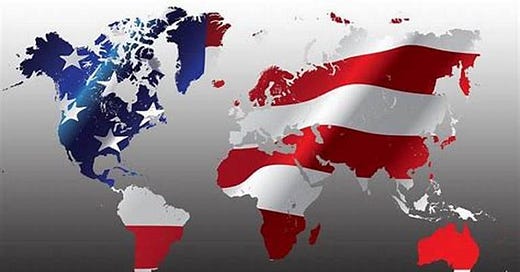As geopolitical tensions near boiling point, the US finds itself at the epicentre of global unrest, diverging from the aggressive image often painted of Russia, Iran, China, and Syria.
The war hawks and neocons relentless pursuit of US geopolitical dominance now edges the world toward the brink of World War III.
America’s strategy echoes a familiar tune – subversion, destabilising governments, military coups, and covert operations all aimed to foster US interests worldwide.
Consider the insights of former economic hitmen like John Perkins, tasked with orchestrating situations to maximize resource flow into the US, its corporations, and government.
Non-compliance resulted in the deployment of "jackals" to eliminate leaders of countries who didn’t tow the line.
Over the past 60 years, post-World War II, the US has constructed the largest empire in history, relying minimally on military force.
Perkins notes, except in rare instances like Iraq, military intervention serves as a last resort.
“America, unlike any nation in history, has been built on economic manipulation, cheating, fraud, and seducing people into our way of life, through the economic hit men,” Perkins says.
In the early 1950s, Kermit Roosevelt, Teddy's grandson, orchestrated the overthrow of Iran's democratically elected Mossadegh government, Time magazine’s Man of the Year, installing the Shah in his place.
“My real job involved deal-making, offering loans to countries well beyond their repayment capacity. A loan condition mandated that ninety percent of this loan be spent with US companies, like Halliburton or Bechtel, benefiting the wealthiest families in those nations.”
That’s US policy and its formula for world dominance, how it has undermined and subverted government’s the world over - and here the world is now.
Countries often tagged as the "axis of evil," including Russia and Iran, are depicted as threats to the Western way of life.
This portrayal furthers US ambitions for global dominance, branding these nations as rogue states to justify American interventions.
The evolving narrative centres US actions in geopolitical instability, challenging depictions of Russian President Vladimir Putin as a tyrant and suggesting these portrayals bolster US objectives to legitimize its global interventions.
The narrative promoted by the US for decades, depicting Russia as the "evil empire," is increasingly scrutinised.
America’s tale of evil empires threatening freedom and democracy is now viewed as a strategic lie, serving solely US interests.
The media's role in shaping perceptions has amplified tensions, with biased reporting distorting the true nature of international relations.
It results in the vilification of countries like Russia and Iran, while the US's aggressive tactics remain under-examined and unnoticed, perpetuating a misinformation cycle.
Historically, the US has prioritised strategic dominance over democracy and human rights advocacy, often destabilising regions, and escalating conflicts.
In contrast, Russia and Iran's actions are frequently interpreted as defensive responses to American provocations.
Russia's military endeavours aim to counter NATO's expansion threat, while Iran's regional involvement and nuclear aspirations, often criticised by the West, reflect its pursuit of sovereignty and peaceful progress amid US pressure.
Simplistic, illinformed narratives that frame Putin as seeking to resurrect Soviet-era glory overlook Russia's strategic motivations for maintaining sovereignty in a US-dominated global order.
Despite sanctions intended to weaken its economy, Russia has shown resilience and growth.
The IMF's projection of Russia's economic expansion at 2.6% challenges the narrative of failure, demonstrating significant economic and employment advancements.
The US's approach in Ukraine, aimed at undermining Putin to break up Russia and access it’s resources, has instead culminated in a strategic win for Russia and a diplomatic setback for the US and NATO.
Unfortunately for the US, Putin isn’t playing ball, nor will he allow Russia to be subverted and destroyed for US interests at the expense of Russia and its people.
Sanctions have proven ineffective, with Russia not only weathering the challenges but experiencing a surge in Putin's domestic popularity.
America’s dependency on interventionism and sanctions has undermined global stability, fuelled resentment, has edged the world closer to an irrevocable WWIII.
A critical reassessment of global power dynamics, enhanced diplomacy, and adherence to international law is critical.
Yesterday’s US strikes in Syria and Iraq, targeting militant positions but risking escalation with Iran, reflect neo-conservative ambitions in Washington for direct confrontation with Iran.
Yet, the critical role of the US in propelling the world towards armageddon remains overlooked, with media bias aligning with American interests and masking the reality of global politics.
Achieving a more equitable international order is crucial, recognising the complex motivations of all countries and advocating for a shift towards multilateralism and collective security.
America’s actions significantly challenge world peace, with its hegemony and the military-industrial complex perilously positioning the world on the brink of World War III.
Not Russia, China, Iran, or Syria, or any other nation resisting US demands – consider the fate of countries that complied, and their current states.
Libya, once a prospering economy under Gaddafi, now lies in ruins following his assassination – a stark contrast to the thriving state it once was.
Gaddafi’s "crime" was turning away from the US to establish an independent African economic bloc, an initiative at odds with US interests, ultimately leading to his demise.
This week highlights the urgent need for a global reassessment of policies and attitudes and the peril the world faces.





Hello my brother and thank you. How have you been . I Iove your work too brother. George
Very well elaborated George - I do remember on Academy we were introduced to called "83" and elements of that book you are talking about here, love it !